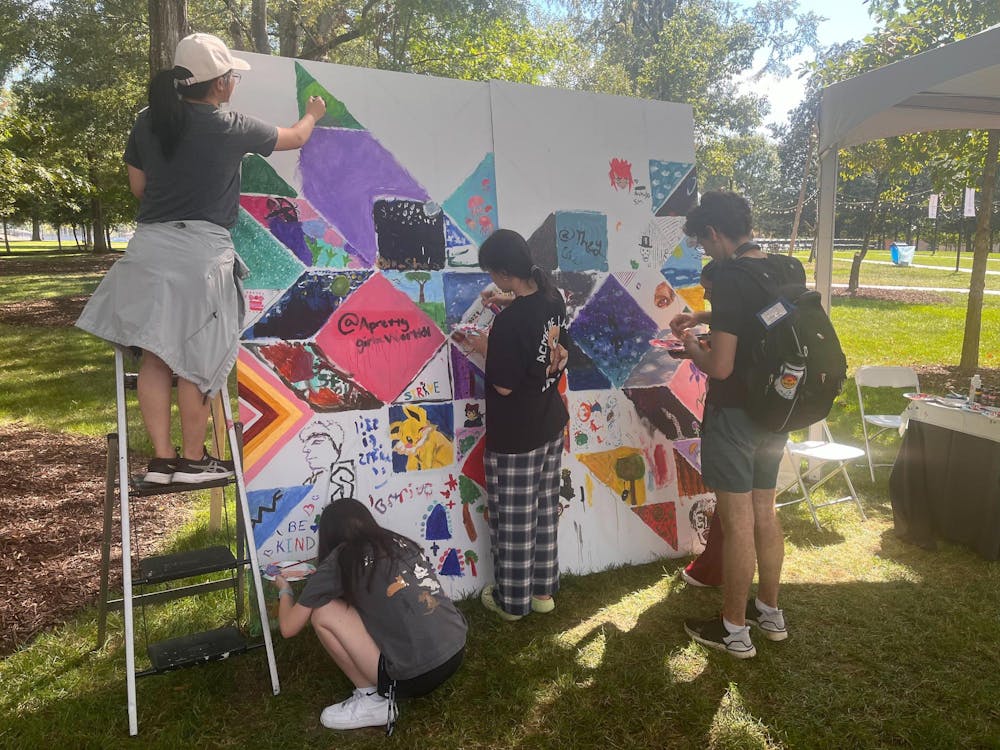Emory University students, faculty, alumni and community members experienced a weekend of festivities at Oxford College’s inaugural Ideas Festival, a free event organized by the Center for Public Scholarship and Engagement. Throughout Sept. 20 to 22, over 40 notable speakers and performers addressed attendees on topics such as history, science, literature, cinematography and music.
Center for Public Scholarship and Engagement Founding Director and Charles Howard Candler Professor of Psychology Kenneth Carter (87Ox, 89C) emphasized the festival’s connection with the greater community.
“We know that faculty are really good at talking to each other about their scholarship, but we’re trying to inspire faculty all over to be able to communicate the things that they do in an accessible, interesting way to the public to inspire the next generation of scholars,” Carter said.
Grammy Award-winning music producer Jermaine Dupri gave the keynote address on Friday evening, accompanied by Sing for Science podcast host Matt Whyte and Georgia Institute of Technology (Georgia Tech) Assistant Professor of Hip-Hop Studies and Digital Media Joycelyn Wilson.
University President Gregory Fenves, Oxford College Dean Badia Ahad and Carter each gave opening remarks introducing the festival and the new Center for Public Scholarship and Engagement.
“Its mission [is] to bring together a diversity of scholars, artists and writers to discuss some of the most pressing and complex issues of our time, at a time when we need more and better models of civil discourse, free expression of ideas and constructive dialogue,” Ahad said. “This event perfectly captures the spirit of education and collaboration that we so value here at Oxford and Emory.”
Dupri began his address by playing his song “Welcome to Atlanta” (2001), followed by a discussion with Whyte and Wilson about Atlanta’s role as a cornerstone of hip-hop history. He described Atlanta as “Vegas in the South” when he wrote the song.
“I don’t think people that lived in Atlanta knew how valuable Atlanta was to culture,” Dupri said.
The hip-hop culture flourished around the same time Atlanta elected its first Black mayor Maynard Jackson in 1973, Wilson observed. She noted that as a cultural anthropologist, she investigates questions about the political influence of hip-hop in the Atlanta community. Wilson also highlighted the increasing prevalence of hip-hop in higher education, citing hip-hop archives at Harvard University (Mass.) and Georgia Tech.
“There are institutions that are preserving hip-hop, not in just the archive space, but in the curriculum and instructional space, and that is getting us to that generation that you’re talking about, and teaching them about the culture that they’re already impacted by,” Wilson said.
At the end of the discussion, Dupri announced a unique opportunity for two Emory undergraduate students to intern for him. He said he wanted to give students a chance to “fulfill their dream.” Additionally, Dupri urged Emory students to be open to meeting new people and learning from one another, which he said was the ultimate goal of the Ideas Festival.
“You’re never too old and too young to learn,” Dupri said. “You’re never too smart to learn.”
The presentations throughout Saturday and Sunday exemplified Dupri’s ideas of openness. Presenters went above and beyond their topic, challenging the audience to engage with unexpected ideas.
Famous Southern chef and James Beard Award-winning cookbook author Virginia Willis delved deeper into the need for challenge and failure while demonstrating a biscuit recipe. She discussed her earliest memories of family and food, which helped her maintain her passion for cooking despite all the obstacles.
“Some of my earliest memories are honestly making biscuits with my grandmother,” Willis said. “There's a picture of me at 3-years-old on a chair making this exact same biscuit, and so food and memory are just so interlinked.”
Oxford Assistant Professor of English Sarah Higinbotham and Common Good Atlanta Board member Shanard Linsey led a discussion about the role of education in prison reform. The presenters showcased the stories of unique individuals and the role education had in creating a judgment-free zone in prison classrooms.
“What we hope for today's conversation is that you might see college a little differently and you might see friendships like Shanard’s and mine a little bit differently, born not out of similar backgrounds necessarily, but out of deep respect for each other and a lot of excitement for the way that these programs can change people's minds,” Higinbotham said.
Author-illustrator Mike Lowery turned his lecture into an interactive discussion and walked among the seats. During his presentation, Lowery handed out sketchbooks to the audience, asking attendees to compile a list of things they liked. From there, he discussed his process, connecting the different “likes” of the audience into a reasonable plot for a children’s novel.
“My hope would be that people would see you can make your own stories,” Lowery said. “You can come up with your own concepts. It’s all about putting together these pieces.”
At each presentation, Emory students, faculty, and local members engaged meaningfully with the ideas posed by the speakers. Students such as Tyler McNulty (26Ox) expressed gratitude for how informative the event was.
“It’s such a cool idea — the bringing together ideas and important speeches for people who have these different ideas that you would never even consider or think about,” McNulty said.
Although just the pilot year, the Ideas Festival left its mark on the Oxford community, closing the gap between greater Atlanta and the Emory community, and leaving people to ponder the new ideas that they heard.

Lauren Yee (she/her) (24Ox, 27C) is a managing editor at The Emory Wheel. She is from Hong Kong, majoring in religion and minoring in German. Outside of the Wheel, Yee is the president of the Hong Kong Student Association and the managing editor for In Via, Emory's Christian thought journal. In her free time, you can find her playing the saxophone, watching musicals, listening to Taylor Swift or enjoying an iced oat milk coffee!






